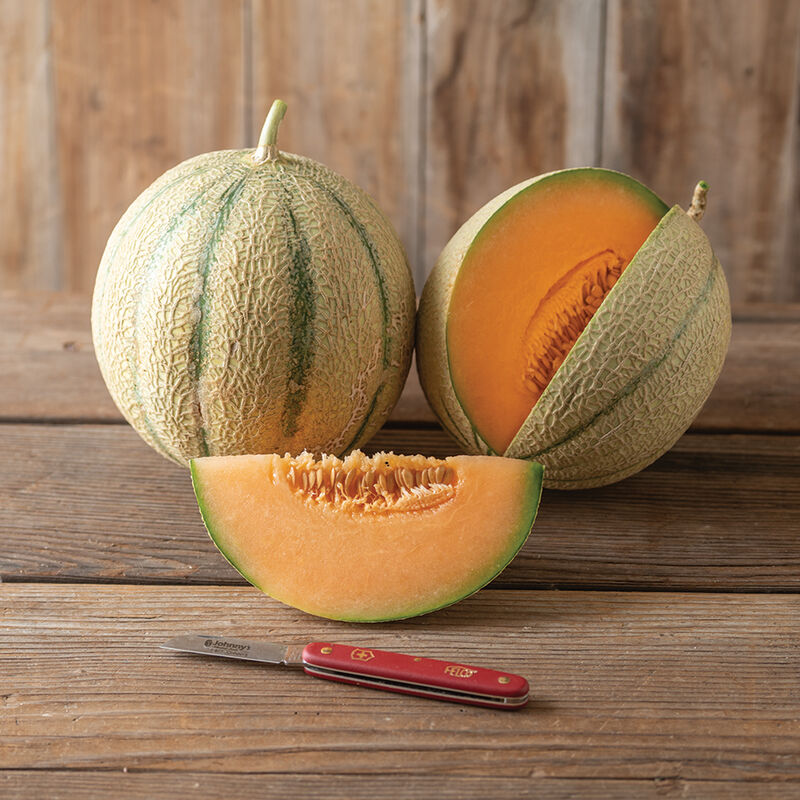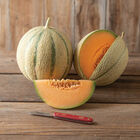Melonade (F1) Melon Seed
Melonade (F1) Melon Seed
Unique sweet-and-sour flavor.
Very attractive, medium-large, netted fruits with pronounced sutures that are ready to cut from the vine when they are pale green to yellow. Tart flavor—the perfect balance of sweet and sour—sets it apart from other melons on the market. Excellent as a dessert or as an appetizer. Avg. 4–5 lb. round to oval fruits. The plants are vigorous and bear their crop in a concentrated set.
Disease Resistance:
- Fusarium Wilt races 0–2 (High)
- Powdery Mildew (Intermediate)
Specs:
- Packet: 15 seeds
- Avg. 16,800 seeds/lb
- This product does not ship to the following countries: United Arab Emirates, Austria, Australia, Barbados, Belgium, Bulgaria, Bermuda, Bahamas, Switzerland, Cyprus, Czech Republic, Germany, Denmark, Estonia, Spain, Finland, France, United Kingdom, Greece, Hong Kong, Croatia, Hungary, Ireland, Iceland, Italy, Japan, Republic of Korea, Kuwait, Cayman Islands, Lithuania, Luxembourg, Latvia, Malta, Netherlands, Norway, New Zealand, Oman, Poland, Portugal, Qatar, Romania, Saudi Arabia, Sweden, Singapore, Slovenia, Slovakia, San Marino, Thailand, Trinidad and Tobago, Taiwan, Ukraine.
SCIENTIFIC NAME:
Cucumis meloCULTURE:
A light, well-drained soil with a pH of 7.0 and a southern exposure is ideal. Good soil moisture is important in early stages of growth and during pollination when fruits are setting. After this point do not water the last week before fruits are ripe, as overwatering can cause bland fruit. Since melons like consistently warm conditions, plastic mulch and row covers will make for earlier crops and better yields, especially in the North. Remove covers when plants have female flowers (identified by the tiny fruit at base of blossom).DAYS TO MATURITY:
From transplanting; add about 10 days if direct-seeded.TRANSPLANTING:
Sow indoors in 50-cell plug trays or 2-3" biodegradable pots in late April or one month (no sooner!) before transplanting outdoors. Plant 3 seeds/cell or pot, about 1/4" deep. Keep temperature 80-90°F (27-32°C) until germination. Handle young plants carefully and never let the soil dry out. Grow seedlings at 75°F (24°C). Reduce water and temperature for a week to harden-off seedlings. When the weather is frost-free, warm, and settled, transplant 2-3' apart in rows 6' apart or thin to 1 plant/cell or pot with scissors and transplant 18" apart. Even hardened-off melon seedlings are tender. Do not disturb roots when transplanting, and water thoroughly.DIRECT SEEDING:
Sow 1-2 weeks after last frost when soil is warm, above 70°F (21°C), 3 seeds every 18", 1/2" deep, thinning to 1 plant.AVG. DIRECT SEEDING RATE:
30 seeds/10', 100 seeds/50', 1M/500', 15M/acre at 3 seeds every 18" in rows 6' apart.INSECT PESTS:
Protect against cucumber beetles with floating row covers applied at transplanting, or with insecticides such as pyrethrin or azadirachtin.DISEASE:
Choose varieties resistant to diseases in your area. Sudden wilt (which is caused by cold weather stress in late summer when plants have a heavy set of ripening melons), can cause plants to wilt almost overnight. Keep plants healthy with good fertility and irrigation to prevent sudden wilt.HARVEST:
Ripeness indicators vary by melon type. Most cantaloupes are ready when the gray-green color begins to change to buff-yellow and are harvested at "full slip" or when a light tug separates the fruit from the vine. Some types, like Canary and Crenshaw, require a bit more pressure to separate the fruit and are harvested at "forced slip." Others, like Honeydew, Charentais, and Piel de Sapo, are overripe by the time the stem can be tugged from the fruit; these must be cut from the vine. See product copy for when to harvest, as there are varietal differences.STORAGE:
All melons should be stored at 85-95% relative humidity. Store ripe netted melons at 36-41°F (2-5°C); store other melons at 45-50°F (7-10°C) for 7-14 days.SEEDS/LB. (AVG.):
18,800.PACKET:
30 seeds, unless otherwise indicated.Johnny's is committed to your success, every step of the way.
We want you, our customer, to be 100% satisfied with all of our seeds, tools, and supplies.
If anything you purchase from us proves unsatisfactory, we will either replace the item or refund the purchase price.




